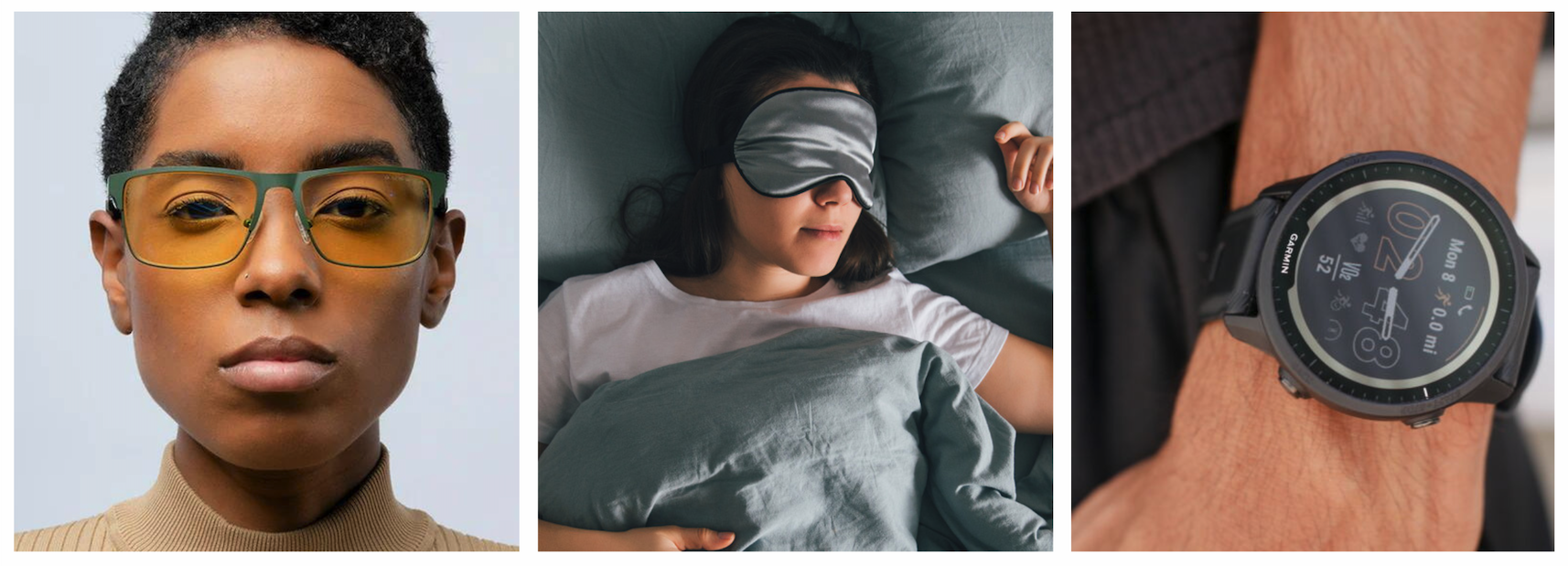Here’s to better sleep.
Weight management, heart health, regulated blood sugar, restored immune function, mental clarity, improved mood, heightened capacity for stress, and more. Sleep is your superpower. Below are five easy, wallet-friendly hacks to help you unleash it:
1. Get a sleep mask (or blackout curtains):
As promised, it’s easy, cheap, and it works. Darkness and light play an outsized role in regulating our sleep cycles. There’s a ton of science behind it, but the gist of it is: our bodies’ circadian clocks respond to light as a signal to be awake, and dark as a signal to fall asleep. So, increase your amount of light during the day to be more alert. And darken your bedroom at night to sleep better (Center for Disease Control and Prevention). You’ll owe your sleep mask a debt of gratitude.
2. Change your phone and tablet settings:
This tip is easy (you only have to do it once), and free! Just schedule Night Shift (iOS) or Night Light (Android) on your handheld devices from two hours before bedtime until an hour after you wake up.
(Schedule Night Shift (iOS): Settings > Display & Brightness > Night Shift. Toggle the Scheduled switch to on. Tap From/To to customize times.
Schedule Night Light (Android): Settings > Display > Night Light. Tap Schedule. Tap Turns on at custom time to customize times).
Blue light waves come from fluorescent and LED lights and back-lit electronic screens on televisions, computers, tablets, and cell phones. Exposure to these lighted screens too close to slumber can make it difficult for you to fall asleep at night or can wake you up too early (Center for Disease Control and Prevention). Night Shift, Night Light and other similar features on handheld electronics turn your device displays to warmer colors to reduce blue light exposure.
While adjusting your phone settings will make a difference—let’s face it, we all spend too much time on our phones—you’re still likely getting a lot of blue light exposure from other sources. I’ve got you covered with hack three.
3. Get some blue light glasses:
It’s a bit nerdy, I’ll admit. But wearing a pair of blue light glasses around the house for a few hours before bed and for an hour in the morning helps further reduce your exposure to disruptive blue light. I have a pair of Gunnar blue light glasses and I fall asleep faster on the evenings when I wear them. I can attest that the extra zzzs are worth the geeky aesthetic.
4. Day drink (I’m only kind of kidding):
If you’re in serious pursuit of a sound sleep, you’re better off skipping the drinks all together. But if you’re going to have a few beers or a glass of wine, do so well before you hit the hay. Alcohol in your system at bedtime leads to fragmented sleep, meaning your brain briefly wakes up and interrupts your sleep cycle over and over. Consuming alcohol at least three hours before bed will give your body a head start on metabolizing it. “If you have that drink with dinner instead of making it a nightcap, odds are your sleep won’t be as adversely affected,” says Dr. Foldvary-Schaefer of the Cleveland Clinic.
5. Use your sleep tracker:
Sometimes sleeping with your wearable can be uncomfortable, but if you can bare it (without it interrupting your sleep), wearing it might be worth it. My Garmin watch is a bit chunky, but I’m used to sleeping with it now and I love checking my sleep stats in the morning. Monitoring my sleep lets me make improvements to my routine based on things I did or didn’t do on nights when I have a sound sleep.
This hack sounds expensive, but rest assured you can get a good night sleep without a tracker—after all, this hack is admittedly more anecdotal than empirical. So, no need to buy a new gadget. But for those of you with a smartwatch or wearable already, use it to your advantage.
There you have it: five practices and products to unleash your superpower.
Sleep well.
